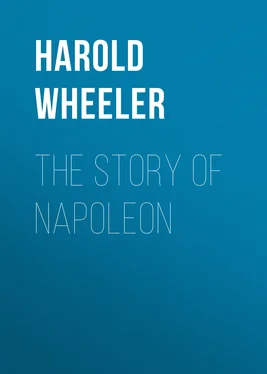Harold Wheeler - The Story of Napoleon
Здесь есть возможность читать онлайн «Harold Wheeler - The Story of Napoleon» — ознакомительный отрывок электронной книги совершенно бесплатно, а после прочтения отрывка купить полную версию. В некоторых случаях можно слушать аудио, скачать через торрент в формате fb2 и присутствует краткое содержание. Жанр: foreign_prose, История, foreign_edu, foreign_antique, на английском языке. Описание произведения, (предисловие) а так же отзывы посетителей доступны на портале библиотеки ЛибКат.
- Название:The Story of Napoleon
- Автор:
- Жанр:
- Год:неизвестен
- ISBN:нет данных
- Рейтинг книги:4 / 5. Голосов: 1
-
Избранное:Добавить в избранное
- Отзывы:
-
Ваша оценка:
- 80
- 1
- 2
- 3
- 4
- 5
The Story of Napoleon: краткое содержание, описание и аннотация
Предлагаем к чтению аннотацию, описание, краткое содержание или предисловие (зависит от того, что написал сам автор книги «The Story of Napoleon»). Если вы не нашли необходимую информацию о книге — напишите в комментариях, мы постараемся отыскать её.
The Story of Napoleon — читать онлайн ознакомительный отрывок
Ниже представлен текст книги, разбитый по страницам. Система сохранения места последней прочитанной страницы, позволяет с удобством читать онлайн бесплатно книгу «The Story of Napoleon», без необходимости каждый раз заново искать на чём Вы остановились. Поставьте закладку, и сможете в любой момент перейти на страницу, на которой закончили чтение.
Интервал:
Закладка:
Later, he went to a more advanced school, and from thence to the seminary of the Abbé Recco. If he was not a brilliant scholar he was certainly more interested in mathematics than is the modern boy in locomotives, and that is admitting a good deal. He also excelled in geography. Both studies proved useful aides-de-camp when Napoleon began to master the intricate arts of strategy and tactics. It is on record that when Napoleon was very young he rode on a high-spirited pony to a neighbouring windmill, and after persuading the miller to tell him how much corn it ground in an hour, quietly sat down and worked out the quantity used per day and week. The tyrant then returned to his panic-stricken mother, who had convinced herself that the boy had probably fallen off his fiery steed and been trampled to death.
When opportunity occurred, the youthful Napoleon scribbled sums on the nursery walls and drew crude outlines of soldiers marching in regimental order. A fondness for the open air early manifested itself, and the earnest student would remain out-of-doors for hours at a stretch, provided he was allowed to follow his favourite pursuits without being disturbed. Should his brother dare to interfere when he was working in the little wooden shanty which his thoughtful mother had caused to be erected for him, Napoleon’s hasty temper would get the upper hand, and the intruder would be forced to beat a hasty retreat, perhaps in a shower of sticks and stones.
“My brother Joseph,” he tells us, “was the one with whom I was oftenest in trouble: he was beaten, bitten, abused. I went to complain before he had time to recover from his confusion. I had need to be on the alert; our mother would have repressed my warlike humour, she would not have put up with my caprices. Her tenderness was allied with severity: she punished, rewarded all alike; the good, the bad, nothing escaped her. My father, a man of sense, but too fond of pleasure to pay much attention to our infancy, sometimes attempted to excuse our faults: ‘Let them alone,’ she replied, ‘it is not your business, it is I who must look after them.’ She did, indeed, watch over us with a solicitude unexampled. Every low sentiment, every ungenerous affection was discouraged: she suffered nothing but what was good and elevated to take root in our youthful understandings. She abhorred falsehood, was provoked by disobedience: she passed over none of our faults.”
Napoleon’s father had no difficulty in deciding what profession to choose for his second son. As for Joseph, he determined that he should enter the priesthood. Napoleon was positive his brother would make a good bishop, and said so.
In this matter of settling the life-work of his boys Charles Bonaparte was helped by the kindly-disposed Marbœuf, one of the two French commissioners appointed by the King to govern Corsica, who frequently visited the house in the Rue St Charles. Napoleon, although only nine years old was now about to enter a larger world, to have an opportunity to appreciate the benefits of education on sounder lines, and to tread the soil of the country which received him as a humble pensioner of the King, and elevated him twenty-five years later to the Imperial throne.
CHAPTER II
The Schooldays of Napoleon
(1779–1784)
In France there were twelve royal military schools to which a certain number of sons of the poor aristocracy were admitted without payment. Marbœuf was successful in securing this benefit for Napoleon, although his father had to prove to the satisfaction of the authorities that he was without fortune and to present a certificate to the effect that his family had belonged to the nobility for at least four generations. This done, the way was made clear for the boy to begin his first serious studies in the art of warfare. As the Corsicans spoke Italian and knew very little, if anything, of the French language, it was decided that Napoleon should stay for a time with his brother Joseph at the College of Autun so that he might acquire some knowledge of the language both were henceforth to speak. To the end of his days Napoleon never learnt to spell correctly, his pronunciation was oftentimes peculiar, and his writing invariably abominable.
Charles Marie de Bonaparte, duly accompanied by Joseph, Napoleon, Uncle Fesch, and a cousin named Aurelio Varese, set off for the land of their adoption in the middle of December 1778. The good Letizia sobbed bitterly when she parted with her two sons, but there were now several other children to be cared for, which must have consoled her to some extent. The travellers passed through Tuscany, where the beautiful city of Florence left an impression on the plastic mind of the embryo soldier, and a momentary sight of the Grand Duke afforded him intense pleasure. They were fragmentary foretastes of things to come, when Napoleon’s troops would overrun the land of the Medici and the scions of royal houses would appreciate a nod or a glance from the now unknown lad whose eyes opened wide with astonishment at the sights and scenes of pre-Revolutionary Europe.
On the 1st January 1779, Autun was reached, and the boys had their first experience of what it means to be hundreds of miles from home and in a country where rugged little Corsica, if mentioned at all, was sneered at, and its inhabitants regarded as scarcely better than savages. Another separation came towards the end of the following April, when Napoleon left for Brienne, now inseparably associated with his name and fame. Tradition has it that Joseph wept copiously at the moment of departure, but down his brother’s cheek there coursed a solitary tear. In the opinion of the Abbé Simon, who held the important post of sub-principal of the College, this was proof that Napoleon felt the wrench none the less keenly. Joseph allowed his emotions to govern him; Napoleon controlled his heart by his will, then as always.
It may be thought peculiar that Brienne, like the other military schools, was controlled by monks. The arrangement was really not so extraordinary as it would appear. Religion, up to the time of the Revolution, had always played an important part in the State, and that great epoch-making volcano had done nothing more than rumble at the period with which we are dealing. The Superior was, of course, the head of the establishment, the various Fathers having particular subjects to teach in which they more or less excelled. Occasionally a member of the laity assisted in a subordinate capacity. Pichegru, who was to become famous in the profession of Napoleon’s choice, taught the elementary class at Brienne.
The pupils lived in almost monastic seclusion. They were not allowed to leave the precincts for the whole of the six years which were allotted to them for education, and during the holidays were never quite free from lessons. What seems a most exacting régime in some ways was, however, neutralised to some extent by rules judiciously forgotten.
St Germain, the energetic Minister of War who had advised the King to found the military schools, had spent much time and thought in drawing up elaborate regulations for their government. The studies included geography, history, grammar, mathematics, Latin, French poetry, German, drawing, music, and eventually English. Special attention was paid, as was only natural, to the art of war, “the trade of barbarians,” as Napoleon once termed it in a capricious moment. Although rich in promise the colleges fell far short of the high ideals which St Germain had hoped for them, as do so many plans for the improvement of the existing order of things.
Notwithstanding all that has been written of Napoleon’s morose and sullen disposition during his student days, it must not be forgotten that the young cadet was at a decided disadvantage in making friends. The matter of language alone was a sufficient barrier to intimate intercourse at this stage of his scholastic career, and his habit of diligent study ill-accorded with the frivolous frittering away of time indulged in by so many of the King’s scholars. Napoleon was a hard worker, but only in subjects which most appealed to him, such as history, geography, and mathematics, all of which had a special bearing on his future career. Latin he despised as being of no practical value to a soldier; translations he positively loathed. He early learned to eliminate the non-essential and trivial, and the easy mastery of details became almost second nature to him.
Читать дальшеИнтервал:
Закладка:
Похожие книги на «The Story of Napoleon»
Представляем Вашему вниманию похожие книги на «The Story of Napoleon» списком для выбора. Мы отобрали схожую по названию и смыслу литературу в надежде предоставить читателям больше вариантов отыскать новые, интересные, ещё непрочитанные произведения.
Обсуждение, отзывы о книге «The Story of Napoleon» и просто собственные мнения читателей. Оставьте ваши комментарии, напишите, что Вы думаете о произведении, его смысле или главных героях. Укажите что конкретно понравилось, а что нет, и почему Вы так считаете.












